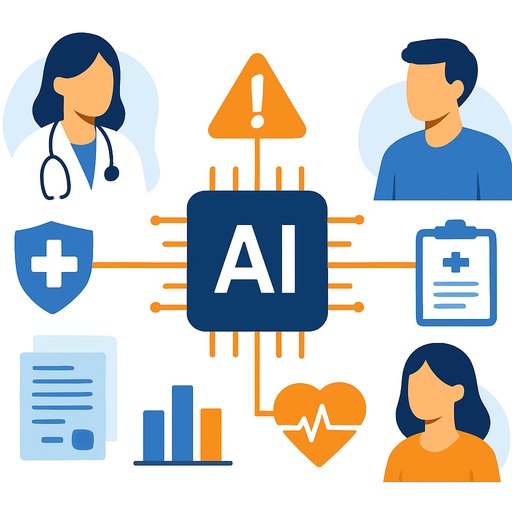AI Software That Gives Clinicians Time Back
Healthcare is drowning in data, documentation, and decision pressure. AI-enabled software can carry the administrative load, surface what matters fast, and help clinicians act sooner.
ASUS is delivering practical AI tools that fit clinical workflows. The focus: reduce clicks, reduce cognitive load, and improve confidence at the point of care.
ASUS Clinical AI Assistant
This multi-agent system augments clinical reasoning and documentation across inpatient wards, outpatient clinics, and health check centers. It has been piloted in hospitals, with real-world feedback used to refine the product into a dependable companion.
1. Smart Summarization
During handoffs, pre-rounding, or referrals, you need the signal-not the noise. The Assistant generates concise EHR summaries so providers can see status, trends, and risks at a glance.
- Specialty-specific (e.g., oncology- or cardiology-relevant findings)
- Scenario-specific (e.g., shift handoff, admission review, discharge prep)
- Personalized to clinician preferences (e.g., labs, imaging, medications first)
It transforms unstructured records into actionable snapshots that support faster, clearer decisions.
2. Personalized Note Generation
Documentation is a major time sink. The Assistant drafts high-quality notes that match your formats and workflows.
- Admission notes, daily progress updates, consultation records
- Weekly summaries and discharge summaries
Templates and prompt-tuning tools keep notes consistent across teams and departments while cutting charting time.
3. Proactive and On-Demand Anomaly Detection
Early risk detection changes outcomes. The Assistant scans vitals, labs, and clinical notes to flag irregular patterns that may warrant attention.
Alerts help teams stay ahead of deterioration and intervene sooner-without adding manual monitoring tasks.
4. Evidence-Informed Smart Recommendations
As medicine grows more complex, guidance must be precise and current. The Assistant supports decisions with suggestions consistent with clinical guidelines and international coding standards.
- Suggested ICD codes based on history and symptoms
- Potential diagnostics, referrals, or follow-up steps
- Proposed medications and care plans grounded in standard practice
Clinicians stay in control; recommendations are assistive, not prescriptive.
5. Pre-Consultation
Getting the right story before the visit saves time and improves outcomes. The Assistant engages patients with structured questionnaires that adapt to their input, clarifying vague symptoms and surfacing risk factors.
Clinicians receive a concise pre-visit summary with key concerns and context, enabling more productive, focused consultations.
ASUS Handheld Ultrasound Devices
Frontline teams need speed and clarity. ASUS handheld ultrasound systems add AI-driven features that improve consistency and reduce measurement time-available as a free software upgrade via the ASUS MediConnect app toward the end of 2025.
Auto Tissue: AI-Based Body Fat Analysis at the Point of Care
Auto Tissue uses ultrasound imaging and AI to estimate subcutaneous fat and muscle thickness without radiation. Clinicians can track body composition over time during routine visits.
Use cases span preventive medicine, weight management, geriatrics, sports health, and aesthetic care-supporting personalized plans and measurable progress.
Auto IVC: Fluid Assessment for Emergency Care
Auto IVC automatically detects and measures the inferior vena cava diameter and collapsibility index. This gives rapid insight into volume status for patients in shock, with hypotension, or unstable hemodynamics.
In EDs and ICUs, quick, noninvasive assessment supports timely fluid decisions that may improve outcomes.
Security, Compliance, and Workflow Fit
The Clinical AI Assistant adheres to rigorous standards, including ISO 27001 Certification and HIPAA compliance. Learn more from ISO about information security management at ISO/IEC 27001 and from HHS about HIPAA.
ASUS handheld systems support efficient imaging with AI-assisted measurements and voice controls to reduce scan time and variability-without sacrificing clinical oversight.
Practical Next Steps for Your Team
- Pick one or two workflows to pilot (e.g., shift handoffs, discharge summaries, ED triage).
- Set standardized templates and prompts to match your documentation style and policies.
- Define alert thresholds and review pathways to keep clinical judgment central.
- Train staff on safe, effective AI use and feedback loops for continuous improvement.
If you're building AI literacy across clinical and operational roles, explore curated programs by job function at Complete AI Training.
Healthcare That Lets People Do the Work Only People Can Do
By combining smart summarization, faster documentation, proactive safety monitoring, and evidence-informed recommendations, the ASUS Clinical AI Assistant helps clinicians spend more time with patients. Paired with ASUS handheld ultrasound features that streamline measurements, teams can move with clarity and confidence where minutes matter.
Your membership also unlocks:






